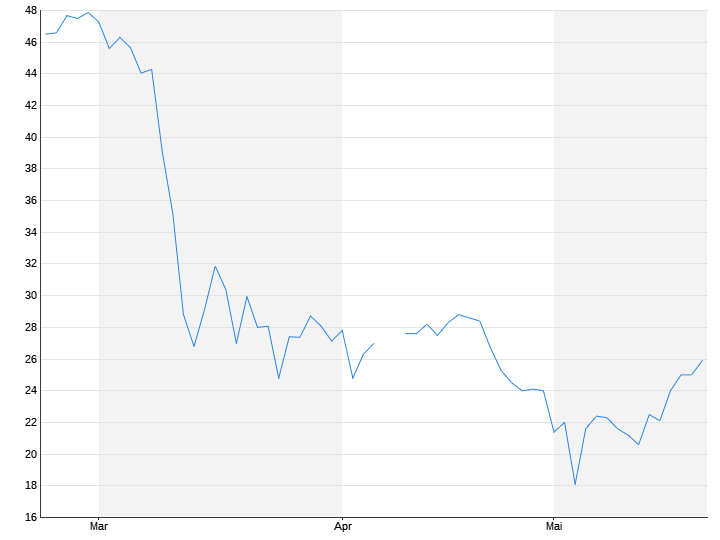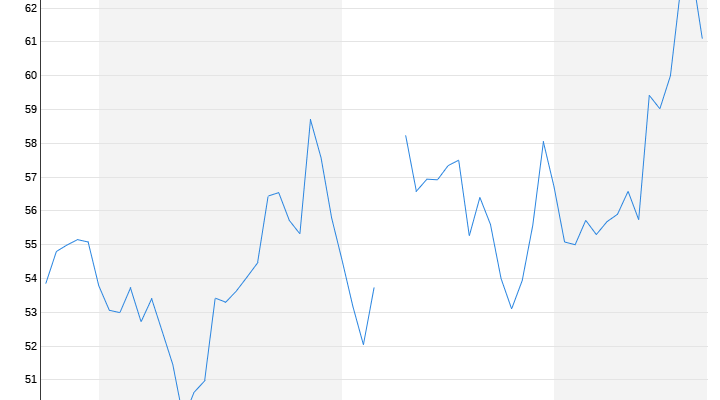crippling debt dispute
US investors remain cautious
05/22/2023, 11:27 p.m
No agreement is in sight in the US debt dispute, which is making investors nervous. The US stock exchanges move in small steps at best, but not in uniform directions. Papers from various regional banks are in demand.
Worries about a possible US default have dampened Wall Street investors’ mood. The Dow Jones lost 0.4 percent to 33,287 points on Monday. The tech-heavy one Nasdaq however, advanced 0.5 percent to 12,721 points and the broad-based S&P 500 closed almost unchanged at 4193 points.
The very short deadline for a compromise in the dispute over the extension of the debt ceiling before the “hard deadline” declared by US Treasury Secretary Janet Yellen of June 1 caused nervousness among investors. After the market close, direct talks between President Joe Biden and the leading Republican in the House of Representatives, Kevin McCarthy, are to continue. Almost at the same time as the closing bell on Wall Street, he announced that he would hold a press conference at around 7:00 p.m. (US East Coast local time; 1:00 a.m. Tuesday CEST). “All eyes are on the meeting. Investors are hoping for clues as to how this is going,” said Robert Pavlik, portfolio manager at wealth manager Dakota Wealth.
A ban on the sale of semiconductors from the US manufacturer set the individual stocks Micron Technology in China to the stock, which lost a good 2.8 percent. The products posed massive security risks, the Chinese Cyber Security Authority (CAC) announced on Sunday evening. “Over the weekend, China reminded that the trade conflict with the United States could escalate again at any moment,” said Konstantin Oldenburger, an analyst at broker CMC Markets. The technology sector has long since become the central playing field for national security between the two largest economies. “The US has already blacklisted Chinese tech companies, disrupted the flow of advanced processors and banned its citizens from investing in the local chip industry.”
Sale at PacWest supports regional banks

The sale of a US Regional Bank home loan portfolio PacWest meanwhile drove up the whole sector. PacWest stock rose 19.5 percent. competitors like Zion, KeyCorp and Western Alliance gained between 4.7 and 10.3 percent. PacWest has entered into an agreement to sell a portfolio of 74 real estate loans to a Kennedy-Wilson affiliate. The outstanding amount of the loans is approximately $2.6 billion. Analysts say US regional bank stock prices have stabilized recently as investors believed the worst of the recent crisis was over. But bad commercial real estate loans posed a new risk. “The transaction takes the pressure off PacWest. It doesn’t have to use large deposits or borrowings to fund this part of its portfolio,” said Gary Tenner, a manager at wealth manager DA Davidson.
Oil recovered earlier price losses in the course of trading and became more expensive. The North Sea variety Brent and the light US variety STI were roughly half a percentage point higher at $75.94 and $71.99 per barrel (159 liters). Production cuts by the oil association Opec+ and an unexpected drop in shipments from Canada more or less offset worries about the US debt dispute. “I expect a lot of volatility in the coming days, with crude oil prices likely to jump higher once an agreement is reached on raising the debt ceiling,” said Vandana Hari, founder of Singaporean oil market research firm Vanda Insights.
